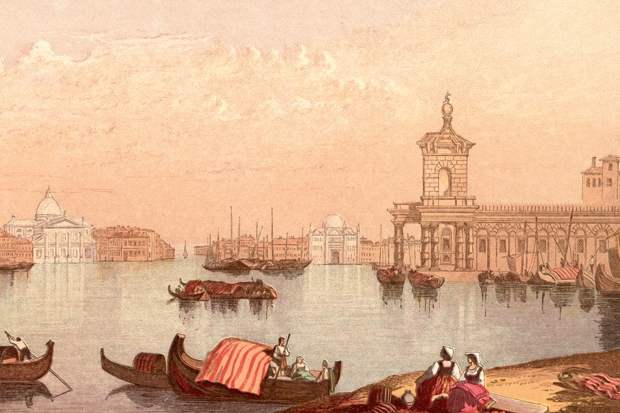For Henry James it was ‘the repository of consolations’. Wordsworth, an earlier visitor, called it ‘the eldest child of liberty’. Ruskin, a self-professed ‘foster child of Venice’, dedicated his life to study of its buildings. Wagner and Browning died there, and Stravinsky left instructions to be buried there, in the island cemetery of San Michele, near the resting place of his friend and mentor Sergei Diaghilev.
La Serenissima, which held the East in fee, is a city like no other. The Republic of Venice may have been ground under Bonaparte’s jackboot in 1797 but its independence of mind and spirit lives in the hearts and minds of all who have fallen under the spell of Saint Mark’s winged lion. The city’s patron saint is interred in the great church that takes his name, with sword and open book the symbols of this unique city.
It is the city of carnival, and the city of death. The gondolas are black, like coffins, and in his most famous story Thomas Mann, another of those northern Europeans who could not resist the lure of the lagoon, wrote of Death in Venice. Visconti filmed it and Britten, who detested the film, made Mann’s novella the subject of his last opera.
‘To arrive in Venice by land, at the station, was like entering a place by a back door,’ wrote Mann. ‘Only by ship, over the sea, should one come to this most extraordinary of cities.’ So came Gustav Aschenbach, Mann’s fictional doppelgänger, on that day in 1912, to find the vision of beauty he was looking for in a Polish boy, Tadzio. And still they come, the writers, artists and composers, all looking, like Proust’s narrator, another self-portrait, for that affirmation of art in life.
Turner found it here, magnificently. Did anybody capture the city’s light and water with greater truth than the Englishman? Monet and Whistler shared that glory. To modern eyes they appeal more strongly than Canaletto and Tiepolo. But the home team can put out a mighty crew. Venice is the city-state of Titian, Tintoretto, Veronese, Bellini and Carpaccio, whose paintings adorn churches as well as galleries.
Part Gothic, part Byzantine, as befits a trading port that looked eastwards, Venice excelled in silk and glass. People arrived from all over to take part in the process of enrichment. It was a tolerant city where money greased the wheels of society — ‘the trade and the profit of the city consisteth of all nations’, as Antonio says in Shakespeare’s drama.
Monteverdi, the first Italian composer of opera, was director of music at Saint Mark’s cathedral. Verdi, the greatest Italian composer, made Simon Boccenegra, doge of Venice, the study of one of his finest works, though it is the sea, ever present, that is the principal character of that work. The sea that made Venice immortal, a city beyond comparison, a jewel for the whole world.






Comments